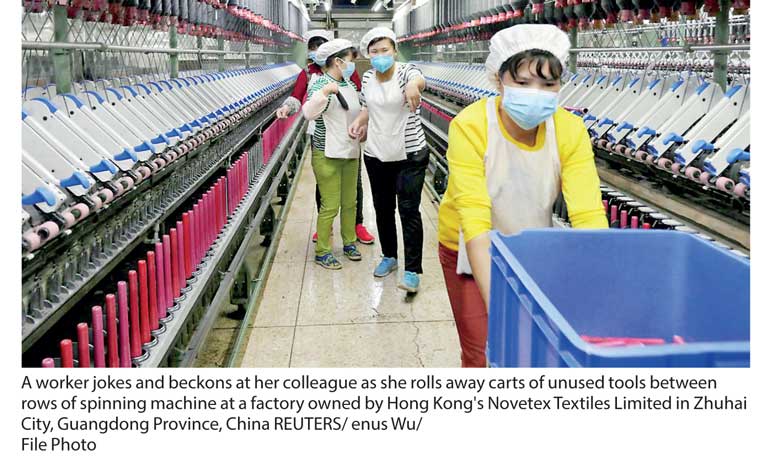Sunday Feb 22, 2026
Sunday Feb 22, 2026
Friday, 29 December 2017 00:00 - - {{hitsCtrl.values.hits}}
 BEIJING (Reuters): Earnings at China’s industrial firms grew at their slowest pace in seven months in November, as demand and producer price gains eased in further confirmation of ebbing growth in the world’s second-largest economy.
BEIJING (Reuters): Earnings at China’s industrial firms grew at their slowest pace in seven months in November, as demand and producer price gains eased in further confirmation of ebbing growth in the world’s second-largest economy.
The lower income underscores a delicate balancing act for authorities as they extend a campaign to reduce China’s reliance on credit-intensive investment without imperilling the economy.
Profits in November rose 14.9% to 785.8 billion yuan ($120.05 billion), the National Bureau of Statistics (NBS) said on its website on Wednesday. It marked the slowest monthly growth rate since April’s 14.0%.
Earnings were pressured in November by a slower pace of price rises compared to previous months, He Ping of the statistics bureau said in a statement along with the data release.
He noted that November’s decline in producer price inflation to 5.8% from 6.9% in October was one of the biggest of the year.
“Previous price increases were concentrated in upstream industries like coal and steel. Inflation in those areas is slowing, and the transmission of higher prices to downstream industries hasn’t been very strong, which hurts profit margins,” said Ye Bingnan, an economist at BOC International in Beijing.
More than half of the increase in profits in Jan-Nov came from coal mining and washing, iron and steel smelting and processing, chemicals, and oil and natural gas extraction, the statistic bureau’s He said.
While the industrial sector has enjoyed a year-long construction boom that has fuelled demand and prices for building materials in a boost to growth, a government-led battle to clean toxic air and a crackdown on financial risks have started to drag on China’s economy.
Chinese steel makers in 28 cities have been ordered to curb output between mid-November and mid-March. A campaign to promote clean energy by converting coal to natural gas has also hampered manufacturing activity in northern cities due to insufficient supply and high prices.
Chinese iron ore and coke futures stretched losses on Tuesday as steel prices fell further, weighed down by seasonal weakness in demand in the world’s top producer during winter.
For the first eleven months of the year, profits reached 6.875 trillion yuan, up 21.9% from the same period and lower than the 23.3% annual growth in the January-October period.
Research firm China Beige Book said in a survey out earlier on Wednesday that with demand strong and prices holding up, Chinese firms continued to ramp up new capacity and production in the fourth quarter. However, it also showed a slowdown in hiring and wages growth in a further sign of slackening economic activity.
China has defied market expectations with 6.9% growth in the first nine months of the year amid the construction boom and solid exports. A slowdown has started to take hold in the last few months as the property sector cools and credit growth ebbs, with Beijing focused on controlling corporate leverage and defusing financial risks.
At the end of November, industrial firms’ liabilities were 6.3% higher than a year earlier, compared with a 6.7% increase at the end of October.
But the ratio of liabilities to assets at industrial firms ticked up to 55.8% at the end of November, compared to 55.7% in October, indicating that deleveraging outside the financial sector has been limited.
Mining industry profits rose 286.8% from a year earlier in January-November while manufacturing profits were up 18.9%, both slowing from January-October.
Profits earned by China’s state-owned firms increased 46.2% to 1.576 trillion yuan in the first eleven months, cooling from a 48.7% surge in January-October.
Ye at BOC International said industrial profit growth will likely slow next year.
“We think next year investment growth will slow, specifically real estate and infrastructure investment,” Ye said.
“So price, sales, and profit gains may slow in industries that are sensitive to investment, while firms related to consumer and industrial upgrades should see better performance.”
Beijing (Reuters): China said on Thursday it will temporarily exempt foreign firms from paying provisional income tax on profits they re-invest into the economy, in a bid to stop foreign firms shifting their operations out of the country.
The move will help “promote growth of foreign investment, improve quality of foreign investment and encourage overseas investors to continuously expand their investment in China,” the finance ministry said on its
website.
Analysts say a planned tax cut by U.S. President Donald Trump, which could lead to a repatriation of earnings by U.S. firms, poses a challenge China’s bid to lure foreign investment.
The temporary exemption on provisional income tax is retroactive from Jan. 1 this year, which means firms that have paid taxes this year will be refunded.
But foreign firms must meet several conditions to be eligible for the exemption, the statement said. These include making direct investment into sectors encouraged by Chinese government while investments must be transferred directly to invested companies.
China’s standard corporate tax rate is 25% although it gives firms more leeway to make profit deductions when they make charitable donations.
Some Chinese and foreign-funded companies have complained about rising business costs, including high tax burdens.